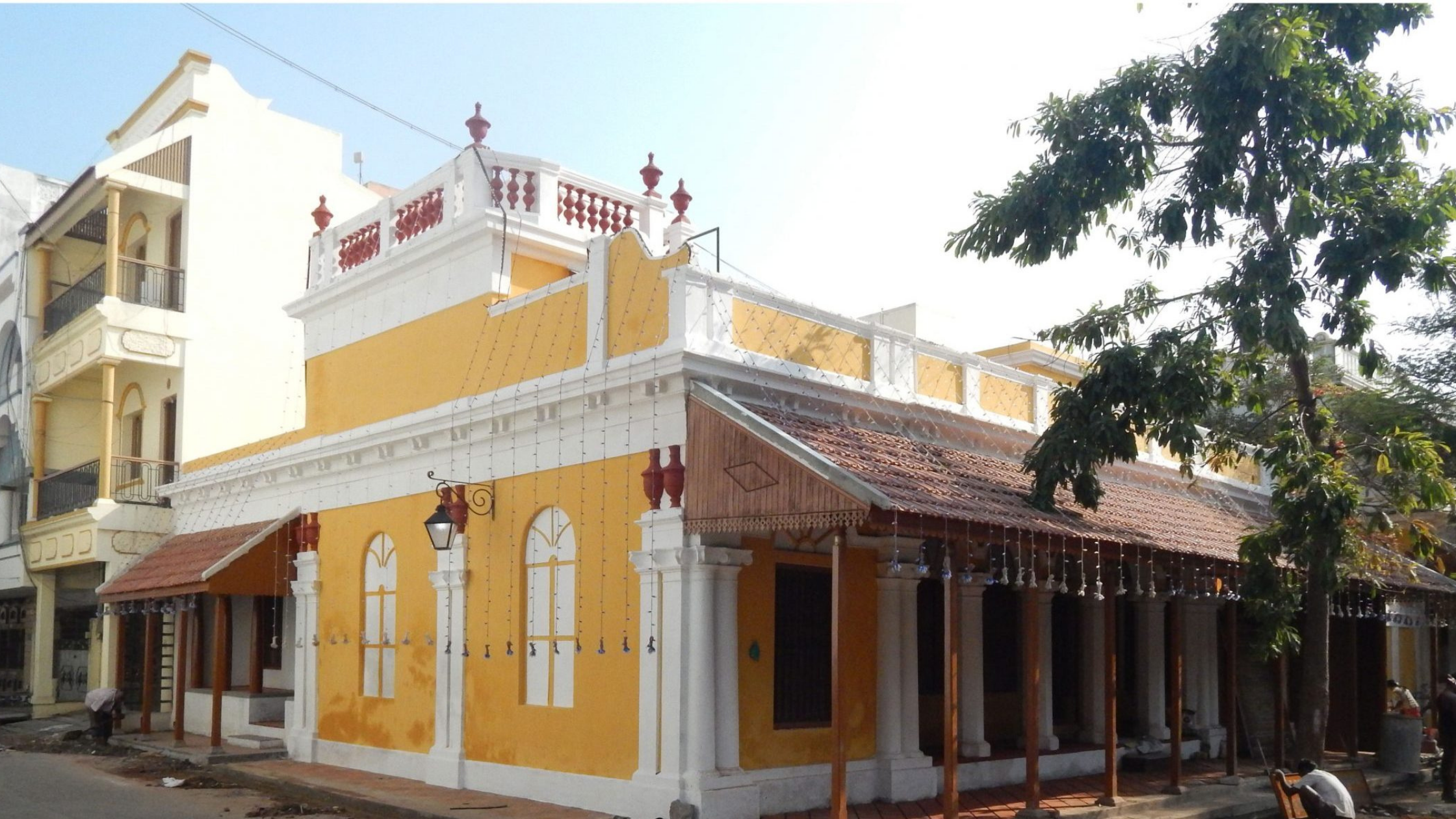Subramania Bharati was more than just a poet. He was a journalist, a linguist and passionate freedom fighter. Above all, he lived his life on his own terms.
What makes Pondicherry special? The quaint French quarter? The nice beach? The well stocked bars? Yes, it has all of these. But it also has a special place in Indian history. Did you know that it was a refuge for Indian freedom fighters in the early 20th century? Pondicherry was French territory at that time, and patriots fighting for independence evaded the British police by quietly slipping into Pondicherry. The French and the British were never the greatest of friends. So, Pondicherry welcomed them in the spirit of “my enemy’s enemy is definitely my friend”! These patriots were mavericks, each one more amazing than the other. Perhaps the most interesting of those was a poet named Subramania Bharati. He was popularly known as ‘Mahakavi’ or ‘The Great Poet’. He was ‘Great’ alright, but much more than just a poet.
Born in a village in Tamilnadu in 1882, language, poetry and music excited him from a young age. He soon mastered English, Hindi, Sanskrit, Bengali, Telugu and Malayalam. Some say he knew 14 languages; but it was in his mother tongue of Tamil, that poetry flowed! He was briefly the court poet of a princely state, but a palace was no place for a free spirit. A chance meeting got him a job as sub-editor of the popular journal ‘Swadesamitran’ at Madras (Chennai). Journalism became his true calling ever after.
Around this same time, he almost single-handedly ran another weekly called the ‘India’. Its publisher trusted Bharati and gave him complete literary freedom. Bharati wrote about reformist ideas close to his heart: gender equality, democracy, individual liberties, inter-religious harmony, halting caste oppression and a whole lot more. These were avante-garde ideas in the conservative India of that time, and Bharati’s pen became an instrument of change. But one idea got him into serious trouble.
India was then a British colony, and Indians were second class citizens in their own land. Bharati wrote powerful articles inciting Indians to overthrow the British. The British were naturally furious. British Intelligence watched him closely, waiting for an opportunity to imprison him. Bharati outwitted them by escaping to Pondicherry, which was out-of-limits for the British police. Even today, it is a mystery how he evaded them – some say he escaped by boat.
The year was 1908, and Bharati was barely 27. Ever the optimist, Bharati soon made himself at home in French Pondicherry. He learnt to speak French, could sing the French national anthem as well as a Frenchman, and studied the works of French intellectuals like Voltaire, Proudhon and Rousseau. He found wonderful friends – fellow revolutionaries-in-hiding like Aurobindo, VVS Iyer and others. Together they were constantly making plans for a new India. His 10 years in Pondicherry were the most productive in terms of his writing. Bharati wrote on diverse topics like nature and environment, love and romance, philosophy and spiritualism.
It was no holiday, though. His revolutionary work continued. He secretly wrote revolutionary articles and printed his magazine, ‘India’, from Pondicherry. He knew he was still being tailed by British spies. So he arranged to smuggle copies of the magazine to Madras, hidden under haystacks in bullock carts.
The spies continued to shadow him. One account says that there was one inspector, 9 sub-inspectors, 45 constables, and dozens of paid informants, all keeping a close eye on Bharati and his friends. Bharati lived in and around Easwaran Dharmaraja Koil Street. For various reasons, including security, Bharati kept shifting houses in that area. There are many lighter stories around this. On November 22, 1916 a violent storm hit Pondicherry. Bharati had just shifted his family from one house to another. The next morning, he found that his old house had collapsed in the storm. The ever-positive Bharati took it as God’s blessing for leading a principled life. One evening Mrs. Bharati was disturbed because she thought she saw a prowler in the vicinity. Bharati easily allayed her fears: which thief would dare burgle a house watched by so many policemen?
But patriotism alone cannot feed empty stomachs. The British identified Bharati’s secret sponsors in Madras, one by one, and threatened them. Funding for the magazine dried up. Bharati tried to make ends meet by selling articles and poems, but that fetched very little in small Pondicherry. Sometimes, when the landlord demanded rent, Bharati paid up by composing and delivering a beautiful impromptu poem. Once, when he had no money to pay the doctor who made a house call to treat his daughter, he sang one of his melodious songs as payment! But debts kept mounting. Mrs. Bharati woke up every morning to the abuses of the unpaid milkman. Soon, even Bharati’s charisma was no answer for sheer lack of money.
Bharati resolved to return to Madras. His loving wife and two daughters had always stoically supported him; they did not deserve this suffering! He would quit politics and direct his journalism to happier themes. An unwritten deal was reached with the British bosses. They would leave him in peace if he quit politics. So, in 1918, he crossed into British Indian territory. He was arrested by the British immediately. But now, prominent members of the society pressured the government into releasing him.
Bharati’s old employer, the Swadesamitran, welcomed him back. He returned to the life of a normal householder. Unfortunately, it didn’t last long. In 1921, the temple elephant that he loved attacked him unexpectedly, when he was trying to feed it. Weakened by years of struggle – financial, emotional and physical, Bharati died soon after. It was a tragic irony that 10 years of poverty in Pondicherry charged him, but 3 years of peace in Madras killed him.
At Pondicherry you can visit Bharati’s last house, lovingly restored by a grateful nation. What was Bharati’s greatest contribution? He had evolved a simple style of prose and poetry that was aesthetically pleasing but rich in meaning. It aroused a liberal outlook and patriotic fervour in an entire generation of Indians and galvanised them into positive action!


Even 200 years after his death, Bharati continues to capture Indian minds. Streets, colonies, Universities and educational institutions all over India are named after him. Tamil movie songs keep borrowing phrases from his poetry. The Government of India annually awards the Subramania Bharati Award to authors of outstanding works of Hindi literature. To the millions of youngsters today, he is a kind of a poster boy representing freedom. His signature moustache and turban lend themselves easily to poster art.
Interested in stories from Pondicherry? Join Storytrails on the French Connections trail, a walking tour through the French Quarter of Pondicherry.
Before Pondicherry became a French colony, it was an unsuccessful Danish colony between 1624 and 1654. In the 1690s, it was briefly a Dutch colony. You can read the story of the Dutch fort of Sadras here: Sadras fort – Losing the battle to obscurity
Image Attribution
2. Subramanya Bharathi’s house – By Neetesh Photography
3. Subramanya Bharathi – By अनजान – http://en.wikipedia.org/wiki/File:Subramanya_Bharathi.jpg, Public Domain, https://commons.wikimedia.org/w/index.php?curid=8284495
Archives
- January 2022
- December 2021
- November 2021
- August 2021
- March 2021
- February 2021
- January 2021
- December 2020
- November 2020
- October 2020
- September 2020
- August 2020
- April 2020
- March 2020
- February 2020
- January 2020
- November 2019
- October 2019
- September 2019
- August 2019
- July 2019
- June 2019
- August 2017
- February 2017
- January 2017
- October 2013
Featured Posts
- Tales that pots tell: Keeladi excavations AUGUST 18, 2021
- The Last Grand Nawab: Wallajah FEBRUARY 10, 2021
- How Tej Singh became Raja Desingu of Gingee FEBRUARY 5, 2021
- How Shahjahan seized the Mughal throne JANUARY 28, 2021
- Alai Darwaza – Qutub Minar Complex, Delhi NOVEMBER 21, 2020
- Marking History through British buildings NOVEMBER 17, 2020
- The last great queen of Travancore NOVEMBER 7, 2020
- Brahmi and the evolution of scripts OCTOBER 15, 2020
- The Cambodian King of Kanchipuram OCTOBER 14, 2020
- James Prinsep – the man who read the writing on the wall OCTOBER 10, 2020
- Mariamman – the Village Goddess who travelled SEPTEMBER 30, 2020
- Misnamed Monuments of Mamallapuram SEPTEMBER 28, 2020








